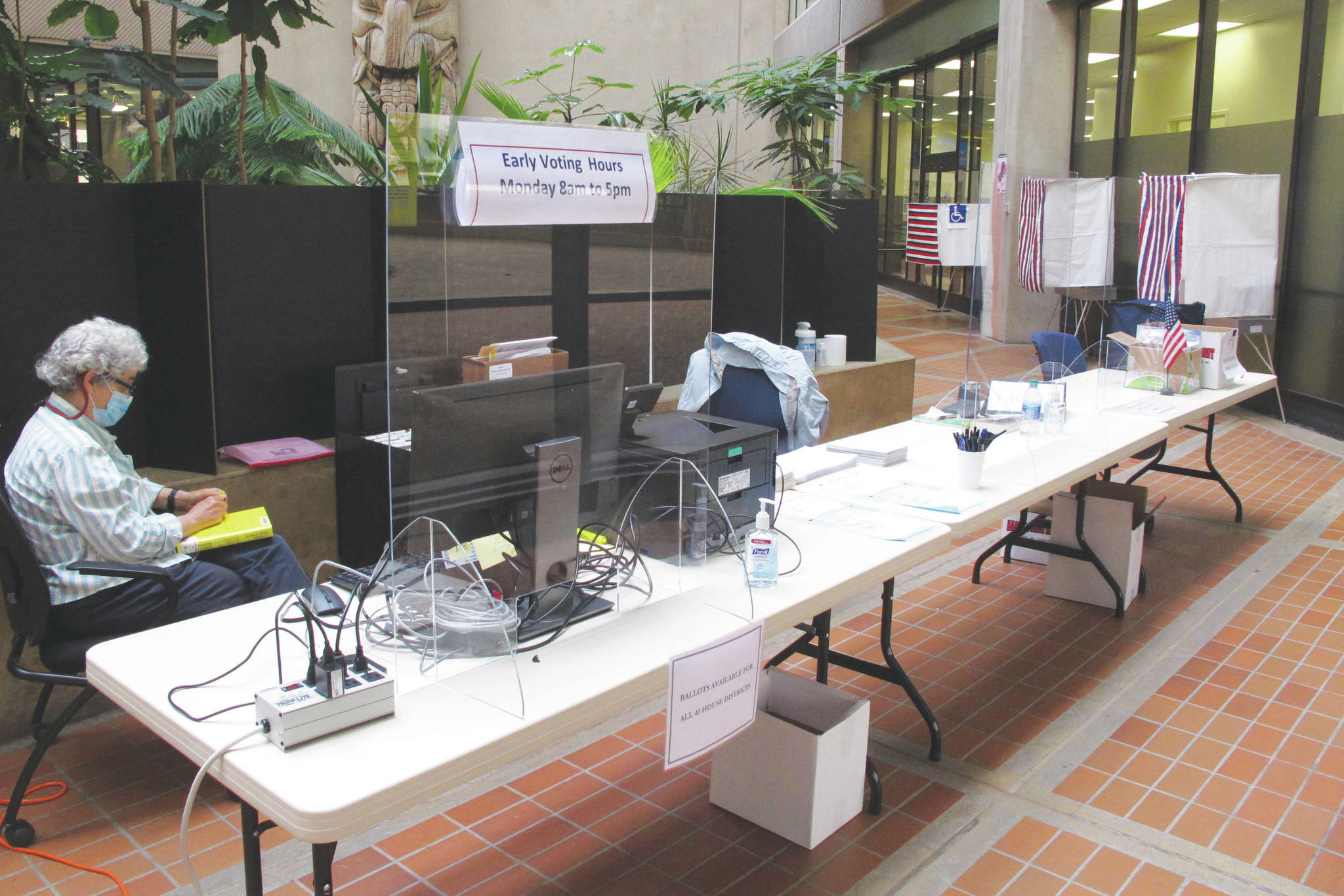By BECKY BOHRER
Associated Press
JUNEAU — Voting in Alaska will look a bit different amid the coronavirus pandemic, with sanitizing and masking stations expected at polling sites and markings to promote social distancing during Tuesday’s primary. A large number of requested mail-in ballots also could mean some races won’t be settled on election night. Election officials are aiming to begin counting absentee ballots on Aug. 25, though the count could start earlier.
The recurring challenge of recruiting election workers has been complicated by the pandemic. Lt. Gov. Kevin Meyer, who oversees elections, said some of the older Alaskans the Division of Elections traditionally relies on had been reluctant to commit because of virus concerns, which forced the division to get more creative. The state upped the pay, allowed nonprofits or organizations raising money for charity to “adopt” and run a precinct and offered state workers a paid day from their usual jobs to work polling sites. There also was a hokey cat meme meant to attract high school students. A week ahead of the primary, Division Director Gail Fenumiai said voting is expected to take place at all precincts.
Workers will be required to wear protective gear, such as face masks; regularly disinfect high-touch areas; try to keep voting booths 6 feet apart and encourage waiting voters to maintain social distance and wear masks. One early voting site, sprawled in the lobby of a state building in Juneau, had a table offering voters masks, gloves and squirts of hand sanitizer before they sign in.
The division said distancing guidelines could limit the number of booths in some locations and that, along with potentially fewer workers at some sites, could mean longer wait times.
Joshua Decker, executive director of the American Civil Liberties Union of Alaska, said he’s concerned about potential long lines that could discourage people from waiting to vote. Lawmakers gave the division the option to conduct elections by mail during the pandemic, but Meyer opted to stick with the state’s current hybrid system, which includes in-person sites and the ability to vote absentee for any reason. Decker said there are concerns with an all-mail voting system, particularly in rural Alaska, where mail service can be spotty. The state also is required to provide language assistance to voters, including in a number of Alaska Native languages. He described as unfortunate the division’s decision to send, unprompted, absentee ballot applications to registered voters 65 and older when he said the distribution should have been broader. His group is not part of a pending lawsuit challenging the division’s actions as discriminatory. According to the U.S. Centers for Disease Control and Prevention, the risk for severe illness with COVID-19 increases with age.
It’s not clear how brisk the in-person vote will be. The division said it has mailed about 54,000 requested ballots; that doesn’t include ballots requested by email or fax for return by mail or fax. For comparison, it mailed about 9,800 for the 2018 primary. Voter turnout in primaries the last 10 years has been as high as 39% in 2014 and as low as 17% in 2016, according to division statistics. Tuesday’s election will decide the party nominees for U.S. Senate and House. There also are some closely watched legislative races.
Karen Rehfeld, a retired state worker in Juneau, said she is a consistent voter and figured when she retired she should be a poll worker. “It’s a really important thing to do,” she said. “You see people that you don’t see all the time and you just make it available for our democracy to work.”
Rehfeld said she’s worked several election cycles and will help run a polling site at the state ferry terminal Tuesday. She said she takes care of her grandchildren and wants to be careful. “I don’t want to get sick and I don’t want them to get sick. It is something that you think about,” Rehfeld, who recently turned 66, said, adding later: “I think we’re going to follow the rules and I think we should be able to take care of ourselves. That’s the plan.”
Lisa Keller’s organization Running Free Alaska, which leads running programs for incarcerated women and seeks to provide support for them in the running community when they’re released, has adopted a precinct in Anchorage’s Government Hill area. Keller said she recalled seeing generally older women when she has gone to vote in the past and felt this year she should “step up.”
Keller, a self-described “hyper-social distancer,” said she is co-chairing the precinct with her 20-year-old daughter, and other members of the organization will be working, too. She said she feels good about the plan, the division’s training materials and what she expects to be a roomy location in a school gym.
“I feel like the state Division of Elections has done everything they possibly can to make it as safe as possible,” Keller said. “I think I have more nervousness associated right now with being a first-time chairperson, just making sure everything is done correctly. That’s my biggest worry at this point.”

